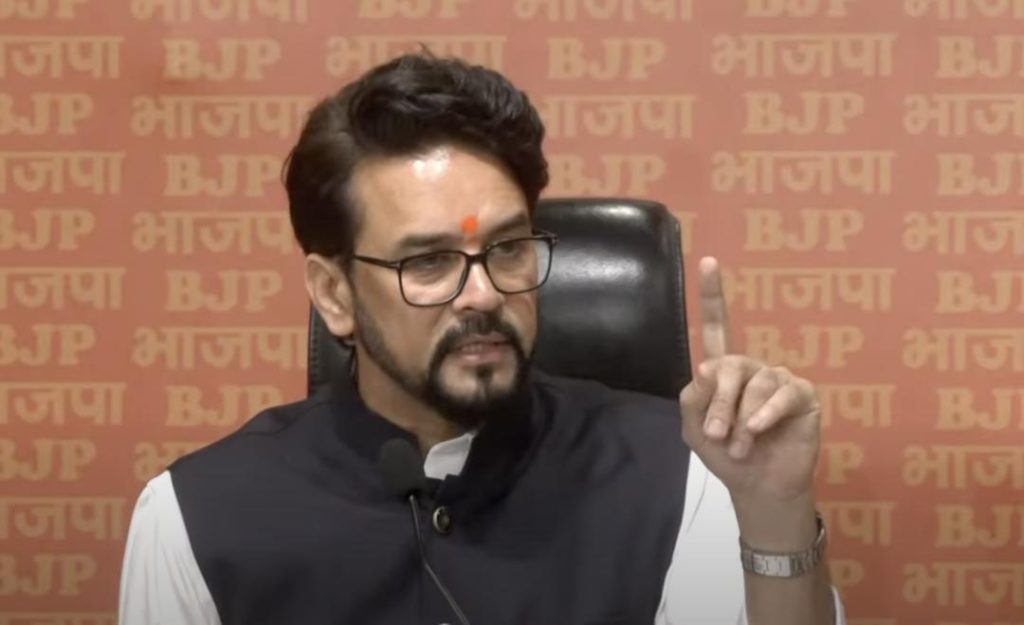
Congress & CPI made Bhimrao Ambedkar lose the poll in 1952: BJP
The Indian political landscape has witnessed numerous elections since the country gained independence in 1947. However, the 1952 general elections hold a significant place in history, not only because it was the first general election after independence but also because it marked a turning point in the political career of Dr. Bhimrao Ambedkar, a renowned Dalit leader and the chief architect of the Indian Constitution. In a recent statement, BJP MP Anurag Thakur made a startling revelation about the 1952 elections, claiming that the Congress and CPI jointly conspired to defeat Dr. Ambedkar in the polls.
According to Thakur, the 1952 elections were marred by electoral corruption, which was laid to rest by the Congress party. He highlighted that Dr. Ambedkar, who was a saint-like leader and a constitution maker, was defeated in the election by a significant margin. Thakur also pointed out that a staggering 74,333 votes were rejected in the election, which he claimed was a result of the Congress party’s electoral malpractices.
Thakur’s statement has sparked a heated debate about the role of the Congress party in the 1952 elections. While some have questioned the accuracy of his claims, others have seen this as an attempt by the BJP to rewrite history and tarnish the image of the Congress party. In this blog post, we will delve into the events surrounding the 1952 elections and examine the validity of Thakur’s claims.
The 1952 general elections were a significant milestone in Indian politics, as they marked the first time that the country was electing its representatives to the Lok Sabha. The elections were held from October 25 to December 21, 1951, and saw a total of 1,886 candidates contesting for 489 seats. The elections were conducted in a single phase, with voters exercising their franchise to elect their representatives.
Dr. Bhimrao Ambedkar, who had played a crucial role in drafting the Indian Constitution, was a key contender in the elections. He had been a member of the Constituent Assembly and had played a vital role in shaping the country’s governance structure. Ambedkar had also been a prominent advocate for the rights of the disadvantaged sections of society, including the Dalits, and had been instrumental in the passage of the Constitution’s provisions for the Scheduled Castes and Scheduled Tribes.
Ambedkar’s candidature in the 1952 elections was seen as a significant development, as it marked a departure from the traditional politics of the time. He was contesting as an independent candidate, outside the fold of any major political party. His decision to contest as an independent candidate was seen as a bold move, as it indicated his willingness to challenge the established political order.
However, Ambedkar’s candidature was also seen as a challenge to the dominant political parties of the time, including the Congress party. The Congress party, which had been in power since independence, was determined to retain its dominance in the elections. The party had a strong organizational structure and a large following, which made it a formidable opponent.
In the run-up to the elections, the Congress party launched a vigorous campaign against Ambedkar, seeking to discredit him and undermine his chances of winning. The party alleged that Ambedkar was a ” divisive force” who was trying to create communal tensions in the country. The Congress party also accused Ambedkar of being a “power-hungry” individual who was seeking to exploit the Dalits for his own political gain.
Ambedkar, however, remained defiant in the face of the Congress party’s attacks. He continued to campaign for his candidature, highlighting his commitment to social justice and his vision for a more equitable society. Despite the opposition from the Congress party, Ambedkar managed to secure a significant number of votes, although he ultimately lost the election.
Thakur’s claims about the 1952 elections being marred by electoral corruption are not entirely new. There have been several reports of electoral malpractices in the elections, including allegations of vote rigging and booth capturing. However, it is unclear whether the Congress party’s actions were as egregious as Thakur has claimed.
In conclusion, the 1952 general elections were a significant milestone in Indian politics, marking the first general election after independence. The elections saw Dr. Bhimrao Ambedkar, a renowned Dalit leader and the chief architect of the Indian Constitution, contesting as an independent candidate. While Ambedkar lost the election, his candidature marked a significant departure from the traditional politics of the time.
Thakur’s claims about the Congress party’s role in Ambedkar’s defeat are controversial and require further investigation. While there is evidence of electoral malpractices in the elections, it is unclear whether the Congress party’s actions were as deliberate and widespread as Thakur has claimed. Nevertheless, Thakur’s statement has sparked a necessary debate about the role of the Congress party in the 1952 elections and the need to promote transparency and accountability in Indian politics.
Reference:






